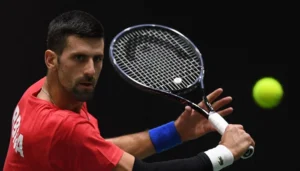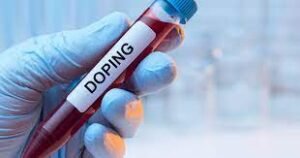Uncover the heated debate as Novak Djokovic faces calls for suspension after expressing outrage over a pre-match doping test. Understand the implications and rules surrounding drug testing in professional sports, and how it has ignited a controversy around the world No 1 tennis player.
In a surprising turn of events, Novak Djokovic, the world No. 1 tennis player, finds himself at the center of a doping controversy, with calls for his suspension echoing in the sports world. The incident unfolded during the Davis Cup quarter-final tie between Serbia and Britain when Djokovic was asked to undergo a random drug test just 90 minutes before his match against Cameron Norrie.![]()
The Outrage
Djokovic expressed his fury at the timing of the request, deeming it “outrageous” and a disruption to his pre-match routine. The situation escalated when a doping control officer attempted to conduct the test before Djokovic faced Norrie. The Serbian player, visibly upset, later explained his frustration to Serbian media, citing the illogical decision to conduct such tests just before a crucial match.
Cycling Champion Calls for Suspension
Former professional road racing cyclist Marc Madiot entered the scene, mistakenly assuming Djokovic had refused the drug test. Madiot, a double Paris–Roubaix winner, has gone as far as demanding Djokovic’s suspension, citing the rules in cycling where refusal to undergo testing automatically results in a positive status and subsequent sanctions.
Importance of Pre-Match Testing

Madiot shed light on the significance of pre-match testing, emphasizing that certain doping substances can be detectable for only a limited period. Testing before competition ensures a level playing field by preventing athletes from evading detection during the match. Djokovic, in response, had previously expressed his advocacy for testing but not at the expense of disrupting his immediate pre-match routine.
Djokovic’s Perspective
Djokovic, while maintaining that he has “nothing to hide,” argued against the timing of the test, suggesting that it should be conducted after the match. He questioned the legitimacy of a private company handling doping agency responsibilities and called for a discussion within the global sports organization to establish its own agency, tailored to the specific needs and understanding of the sporting ecosystem.
The Global Debate
The incident has sparked a global debate on the intricacies of drug testing in professional sports. Djokovic’s call for a reevaluation of testing procedures resonates with other athletes who argue that the current system lacks a nuanced understanding of the demands and routines of top-level competition.
A Crossroads in Doping Regulations
As the debate over Djokovic’s doping test continues, it has become a flashpoint for discussions on the efficiency and practicality of current anti-doping regulations. The incident has not only put a spotlight on the complexities surrounding pre-match testing but has also ignited conversations about the need for a more athlete-centric approach to drug testing in professional sports. Djokovic’s case is likely to serve as a catalyst for potential changes in the regulations governing anti-doping measures, as the sports world watches closely to see how this controversy unfolds.
Now lets also learn about :
What is a Doping Test?

A doping test, formally known as an anti-doping test, is a screening process designed to detect the presence of banned substances or performance-enhancing drugs in an athlete’s system. These substances can range from steroids and stimulants to hormones and masking agents.
Why is it Done?
The primary purpose of doping tests is to maintain the fairness and integrity of sports competitions. By identifying and deterring the use of illicit substances, these tests ensure that athletes compete on a level playing field. The ultimate goal is to safeguard the principles of fair play and the spirit of true athletic achievement.
Who Undergoes Doping Tests?
Athletes across various sports and competitions are subject to doping tests. This inclusivity aims to create a uniform standard for all participants, regardless of their sport or level of competition. Both elite athletes competing at the highest levels and emerging talents in youth competitions can be selected for testing.
When and How is it Done?
Doping tests can occur at any time, including in-competition and out-of-competition periods. In-competition testing typically happens around the time of a specific event, like a match or race, while out-of-competition testing can occur at any other time, ensuring athletes remain vigilant about their choices year-round.
The process involves collecting samples of an athlete’s blood, urine, or both, depending on the substances being tested for. Trained anti-doping officials oversee the collection process, ensuring its integrity and adherence to strict protocols.
Applications and Use of Doping Tests
Doping tests serve multiple purposes in the world of sports:
- Deterrence: The existence of doping tests acts as a deterrent, discouraging athletes from resorting to banned substances to enhance their performance.
- Detection: The primary function is to identify athletes who may have breached anti-doping rules by using prohibited substances.
- Fair Competition: By preventing the use of performance-enhancing substances, doping tests contribute to creating a fair and equitable competitive environment for all athletes.
Why is it Important?
The importance of doping tests can be encapsulated in a few key principles:
- Preserving Fair Play: Doping tests uphold the core principle of fair play by ensuring that success in sports is determined by natural skill, training, and dedication rather than artificial enhancements.
- Protecting Athlete Health: Some banned substances pose serious health risks. Doping tests serve as a safeguard, protecting athletes from the potential harm associated with the use of such substances.
- Maintaining Public Trust: Upholding the integrity of sports through effective anti-doping measures helps maintain public trust in the authenticity and honesty of athletic achievements.
In conclusion, doping tests are not just a regulatory requirement; they are a cornerstone of ethical sportsmanship. They stand as a testament to the commitment of the sports community to uphold the purity and fairness that underpin the true spirit of competition.
Also read :https://biziconic.com/understanding-cramps-in-cricket/